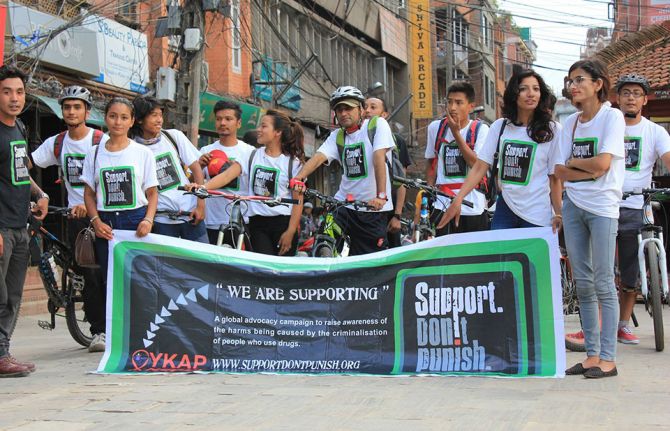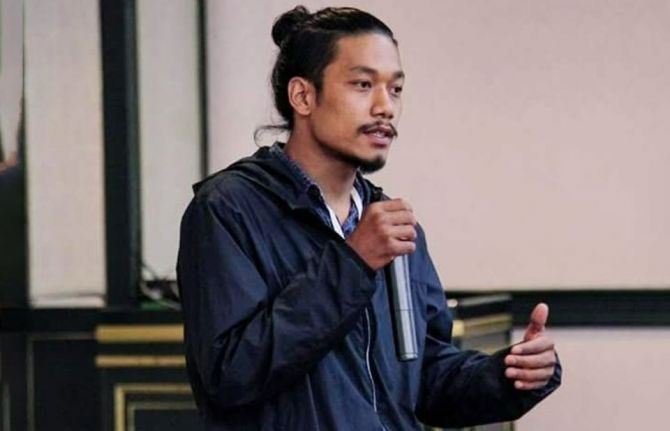



Feature Story
Demanding more options for young people who use drugs in Nepal
26 June 2023
26 June 2023 26 June 2023“Drugs were a way to escape from reality. But because of it, I have faced a lot of discrimination,” said Yukusna Kurumbang. “After a while I had no one around me. No friends I could contact. I have my family but they do not trust me. I am trying to improve.”
There aren’t many resources at Ms. Kurumbang’s disposal. She’s fashioned her own path to recovery including volunteering with YKP Lead Nepal—a youth-led organisation.
“I’m investing in myself and others to escape drugs,” she explained. “I’m trying to control my mind.”
The organisation’s President, Rojal Maharajan, recalls the feeling of isolation he too faced while using: “It’s very humiliating—the gossiping and negative comments. My family also got sick and tired of me. Eventually I had no one to tell about my problems and my mental health status.”
He started his advocacy eight years ago after a successful rehabilitation stint.
“I wanted to do this work to make sure young people who use drugs are treated as human beings. They deserve to have a good life and better opportunities,” he said.
These deeply personal perspectives help YKP Lead Nepal respond to the addiction challenge facing Nepal’s youth. And it’s a complex challenge.
There was a 2021 review of the human rights situation of people who use drugs in Nepal by the International Drug Policy Consortium, Recovering Nepal, YKP LEAD Nepal and Youth Rise International. It notes that the Narcotic Drugs Act criminalises not only drug possession, but addiction itself. According to a 2019 survey of people who use drugs, almost half had been arrested for drug use or a related offence. Among people who injected drugs the arrest rate shot up to 63%.
Treatment for drug dependence is privatised and inaccessible to most, including residents of border towns where services are most scarce. Among those who have had access to drug treatment, one in ten reports having experienced ill-treatment, violence and even torture.
The Government of Nepal has made progress around the provision of harm reduction services including needle and syringe programmes and opiate agonist therapy (OAT). However there are allegations that police frequently harass and detain people visiting these facilities.
“Punitive drug policies across the region have created a culture of violence and impunity by law enforcement,” said Ikka Noviyanti, Regional Coordinator of Youth LEAD, the Asia and the Pacific young key population network. “This makes it more difficult for people to reach the range of prevention and treatment services they need to stay safe. The situation is even more dire for youths.”
A 2019 Ministry of Home Affairs survey determined that over three-quarters of people who use drugs in Nepal are under age 30. Another study found that one-third of young people who use drugs started before age 15, with almost half commencing drug use between 15 and 19. The advocates say that in lieu of heroin which is expensive, there’s a growing trend of young people mixing and injecting tranquilizers like Diagepam, Nitrazepam and Dormin.
Injecting drug use increases the risk of abscesses as well as illnesses including HIV, Hepatitis B and C. HIV prevalence for injecting drug users is 3% for males and 2% for females. By comparison, Nepal’s adult general population HIV prevalence is 0.1%. YKP Lead Nepal is advocating for disaggregated data so they can better grasp the scale of the HIV burden carried by young people.
The organisation shares safety information with clients along with clean needles and syringes. During the Covid-19 lockdowns, for example, they home delivered both food and harm reduction packages. Their outreach includes homeless young people.
But the advocates say that even when clients are aware of the risks, there are barriers to staying safe.
“Most of them don’t want to go to the service sites,” Mr Maharajan explained. “Many of the young women have told us they are harassed at the OAT clinics. Others have a concern that the people running the needle exchange programmes are from rehabs. They don’t want to be forced to go (to rehab) because they are fearful of torture.”
UNAIDS Country Director for Nepal, Masauso Nzima, says that the Government of Nepal has made a move in the right direction with its investment in harm reduction services. However, more needs to be done to ensure a people-centred approach to drug policies “if we are to make a sustained difference in the lives of young people”.
“A critical step is the adoption of laws that treat drug dependence as a health condition rather than a crime. Action is also needed to outlaw torture and ill treatment, holding violators accountable and providing increased oversight for rehabilitation centres. Finally, we are advocating for expanded access to drug treatment and harm reduction programmes, without discrimination,” Mr Nzima said. “That means young people, women and people living in all parts of the country should have equitable access.”
YKP Lead Nepal goes a step further, calling for designated days for young women to access harm reduction services and for young people to be among the service providers.
With support from UNAIDS Asia Pacific, Youth LEAD is now piloting a “Regional Healthcare Worker Training Manual: Friendly HIV and SRHR services for young key populations in Asia Pacific”. The approach is meant to address the multiple barriers to young key populations accessing services including concerns about privacy and confidentiality, stigma and discrimination among healthcare providers, inconvenient opening hours and service packages that do not speak to their specific needs.
“Young people account for one of four new HIV infections in Asia and the Pacific,” Ms. Noviyanti said. “We are failing young people. But with targeted investments for youth-led responses and action we can turn the tide.”



